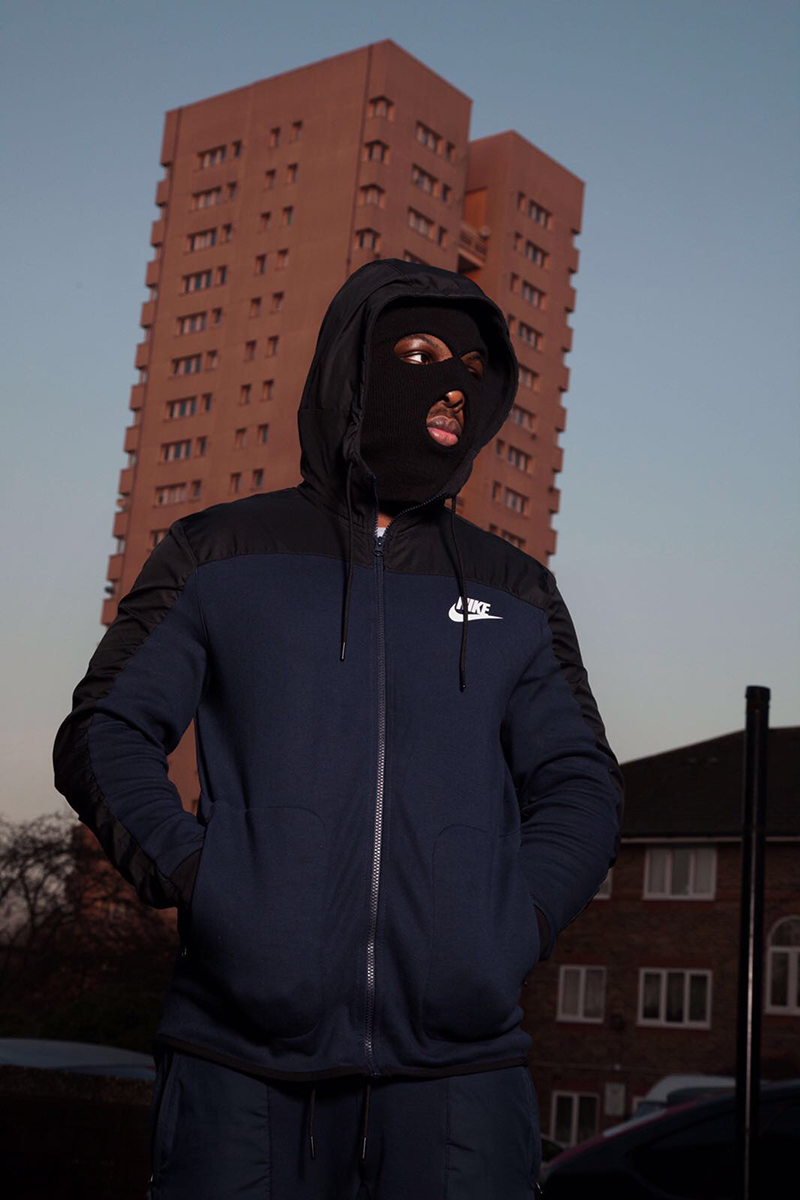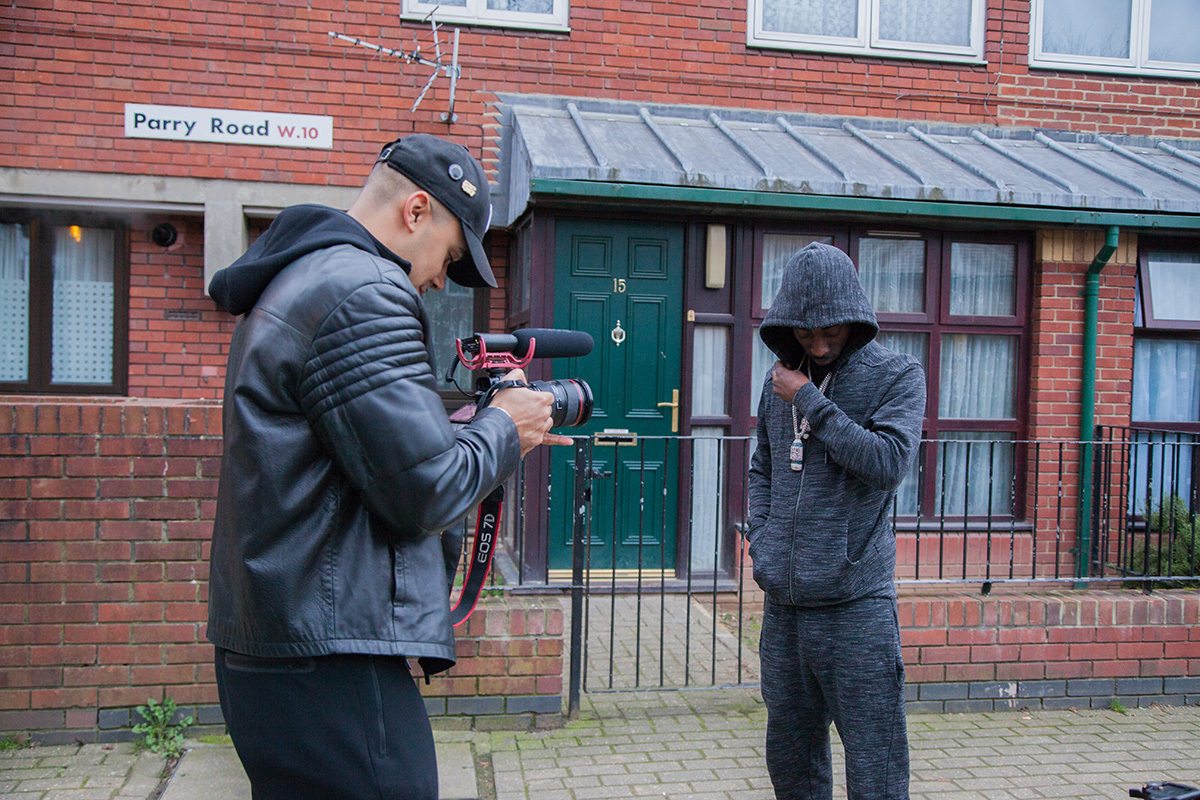It’s rare that a documentary matches its content as neatly as LDN, the DIY music doc currently causing a huge stir— and dovetails with the underground rap scene that it chronicles. The film, beautifully shot on a handheld cam, eulogizes a new generation of London-based artists that are racking up millions of views that exist largely outside the traditional music industry, creating all the hype with none of the budget and infrastructure.
Director/producer Nathan Miller himself is similarly adept at eschewing the well-worn paths of the film industry. There has been no grand film festival premiere and no coordinated ad campaign — instead he simply released the film on his own YouTube channel and shouted about it on social media. The film is astutely curated, focusing on artists with huge underground fanbases, but little mainstream media attention, the likes of J Hus, Belly Squad, 67, Youngs Teflon, Fredo, and more appearing in the film. As a result of speaking to this hungry, under-served audience, LDN has now been watched nearly 200,000 times in less than a week.
We caught up with Nathan on the phone on the day he uploaded LDN to the internet. At the time, he had no idea how well it was going to do, but still seemed quietly confident. And it quickly transpired that this self-belief was something that had driven him from his very first forays into filmmaking.
LDN is very slickly made. What’s your background in film?
I did media studies in college. I got an A and I could have pursued it. So, I was in the college library writing my application and I looked up and everyone else in the library was there doing the same thing. I closed the document — I didn’t even save it — and I was like, “You know what? I don’t want to be like everyone else.” I could have gone and studied, but instead I finished college, worked in retail, and saved up to buy a camera. I made a doc and Ace Hotel saw it and commissioned me to do the documentary out in New York. They loved it and asked me how much it’d cost to deliver another four. They sent me out to LA, Palm Springs, New Orleans, and then I came back from that and started shooting LDN.
So what was the inspiration behind shooting LDN?
I did a piece about a DJ out in New York called Cipha Soundz. After doing that, I came back to London. I knew the scene here was bubbling, but I didn’t know how much. I was watching Santan Dave perform and I just got gassed. A friend said to me, “Your next thing should be about London,” and they were like the fourth person to say it to me, so I decided to do it. From there, I just started linking up with people. My thing was that when you talk about London music, people always talk about Skepta or Section Boyz UCAS. They are very much London, but there’s this other side of the scene that’s huge in its own right but in its own little bubble. I wanted to break down that wall. You get artists that get millions of views on Link UP or GRM, but they’ve never been featured in The Fader. Whereas all of my stuff tends to get that kind of attention. It’s that weird parallel world and I wanted to shine a light on how the scene looks through my eyes.
And were you inspired by any other docs in your approach?
I used to watch City of God a lot. You have so many different characters in that film, and the unique way the director tells you the story is that you might meet a minor character at the beginning, then midway through the film that minor character becomes a main character. When I was creating LDN, I made it so that you might hear about an artist at the beginning, but later on you’d see them again in a different light.

You’ve managed to cover a host of people, and make it look good while you do so. Did you have any sort of budget?
The most I ever paid was going to Bristol to shoot Hus. Other than that, it was just reloading my Oyster card and paying to get into clubs. There was no budget. I was working for the Ace Hotel as a doorman when I started shooting this, but I was getting calls asking me to go and shoot something with hardly any notice. I knew that I always wanted to do this over a normal day job and I didn’t wanna mess them around, so I just left. I think I had two month’s pay, but I knew that I was making something great. It didn’t cost a lot of money, but it took a lot of time. In theory, it would have been made a lot sooner, but some of the artists weren’t that quick. One of the rappers I messaged asking to be in it messaged me back six weeks later saying, “What’s it about?”
Did you know a lot of the people involved when you first started?
It was more friends of friends. I got one person, then they led to the next. J Hus was the first person who I confirmed that was on a bigger scale that I didn’t personally know. And from him I reached out to more and more people and the ball kept rolling.
There’s some amazing footage in the middle of the documentary of J Hus walking around central London getting constantly mobbed by kids.
Yeah, the J Hus scenes are some of my favorite in the film. Someone was telling me that they were shooting him in Dalston for some magazine. It was around school closing time and there was just an army of kids following him around. He’s blowing up.
And I think what he represents — and what comes across in LDN — is how many different sounds are going on in the capital right now.
Absolutely. You’ve got 67 and Reekz MZ — and they’re the drill sounding artists — and then J Hus, Kojo Funds, and Belly Squad. We don’t even have a name for the sound they’re doing yet — that afrobeat-rap thing. And then you’ve got conscious rappers, rappers to turn up to. There’s so many different varieties in the scene and with all the attention on grime. There’s so much more going on.

Do you think the lack of having the spotlight has allowed it to develop in its own way?
When I spoke to Semtex and Morgan Keys, they both pointed out that this new afrobeat kind of sound almost mirrors where grime was when it first came out and no one could name it. There’s all these artists doing crazy headline shows every week. It’s crazy out here now.
So why is it that there are artists who can have multi-million viewed videos, but struggle to break out beyond their small niche scene?
I don’t know. It’s hard to say. The scene is doing amazing, but the artists that are the more hood people, the more crud rappers, fall under radar.
Even though they are often doing better than the grime artists in terms of views
You have to be really in the scene to know all the new guys though. You have to be in the loop to know the people in this documentary, but once you’re in that loop, these people are superstars.
A huge amount of the artists talk about view counts as the most important thing — but how does an artist get paid off view counts when they are so often letting other channels host their videos?
This is a huge debate. I was talking with my friend the other day and he was telling me who was popping and I was disagreeing with the names he was saying. He was saying, “Oh, they’re getting nice views” — but to me someone is popping when they can drop different tracks on their own channel and get at least 50,000 views on each. That criteria cuts off a lot of people based on the fact they haven’t dropped stuff on their own channel. That’s people like J Hus, Nines, Stormzy, Dave. But if you’re coming new to the scene then you need that exposure. If a track hits a million on someone else’s channel then things open up and you can get show money.
And there are a lot of shows going on right now.
Every day there’s a show going on and people are going. They are packed out. This is happening daily. Not3s just had one track on GRM Daily and he’s doing shows all the time. Now these guys are making legitimate money and it’s a new sense of pride for their family. The whole scene is blowing up.
Read: Why this is such an exciting time for the Afrobeats scene in the UK.
Credits
Text Ian McQuaid
